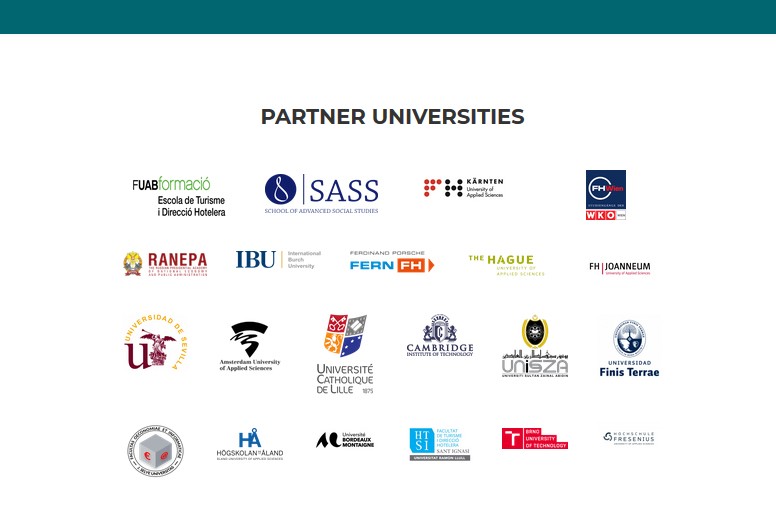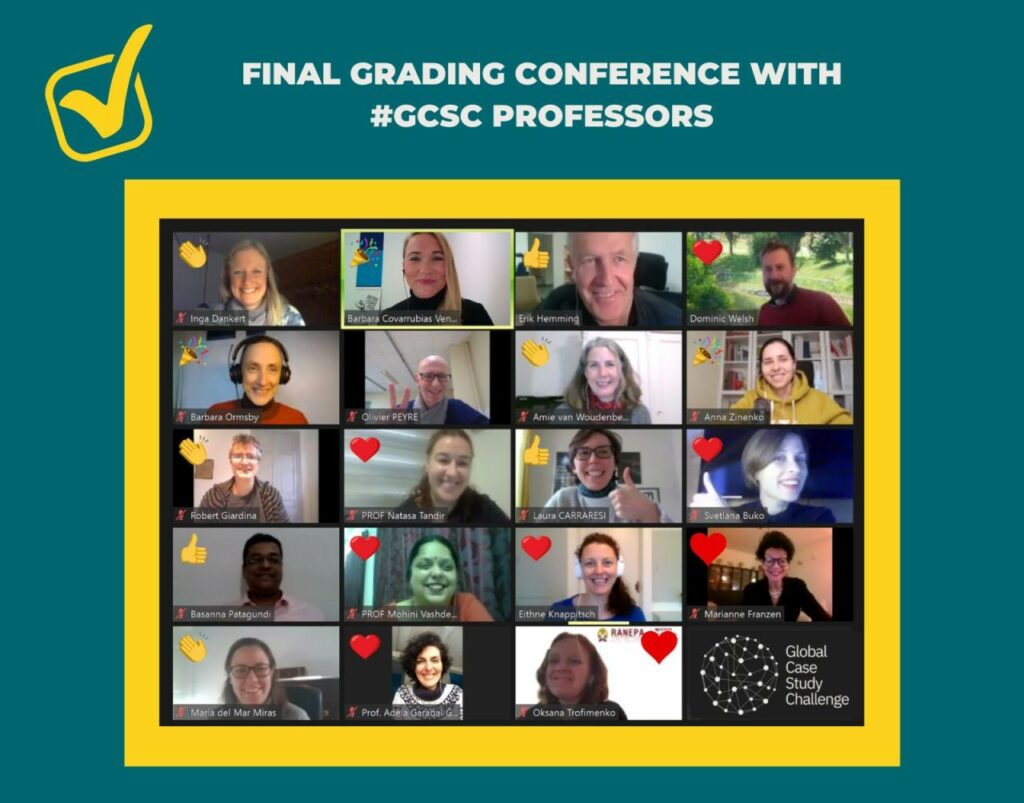Multi-level total immersion experience helps GCSC professors operate on several levels: 1) representing university and country in the international COIL project; 2) serving as a support mentor for the university students who are encountering this new type of experiential learning for the first time; 3) serving as an evaluator for the assigned GCSC teams, providing formative and summative feedback in oral and written form to the milestones of the GCSC project; 4) connecting to the team of other GCSC global professors from all over the world by co-facilitating and co-grading together, reflecting on the way students tackle experiential learning process of the work in the virtual global teams.
Representing the Country and University in the Global Project
Joining the experiential 3-month program with a group of students is a great honor and great responsibility. I had an opportunity to bring in a small group of MA-level students from Slovenian University (Faculty of Applied Social Studies, Nova Gorica). This was the first time Slovenia as a county was represented in the project. It was interesting to see the geography of the academic institutions: from Latin America to Europe to Asia. Students were working together in small mixed teams, learning about each other’s ways of thinking and managing project implementation together.

Serving as a Support Mentor to my Students
Role of the coordinator for my Slovenian cohort was essential because it was a way to help the learners get out of the “university environment framework” and transition into the “global learning framework” environment. From my perspective, we as GCSC professors are serving as bridges to help learners logically connect their experiential learning to the home university program experience.
Within our University GCSC candidate-group we can delineate two categories of participants: Slovenian locals and international students who are studying in Slovenia. Participants also could have a different level of prior experience with intercultural communication. In my case, it was a mix of junior and advanced members. With the richness of the experiential learning, GCCS offers a very rich immersion for both junior and senior-level participants, and it is the role of the professor to help facilitate this experience for diverse students with diverse backgrounds. Three-level “in-house” approach could include three steps: on-boarding orientation, “pulse checking”, re-entry (very similar to the facilitation of the international exchange experiences)
On-boarding orientation: Prior to the start of the GCSC engagement we got together with my team, reflected on their backgrounds and experiences, and talked about the expectations. Interestingly, students self-directed very well and identified what they want to get out of this GCSC 3-month program with “what’s in it for me” attitude. On-boarding is an essential step of setting the stage for successful learning: it’s important to take time for the students prior to the start of the Global Case Study Challenge and set their expectations, explain the process of the 3-month GCSC learning and connect GCSC to their current class in order to make sure they see and understand how the GCSC experience fits into their regular classroom work. Experience levels of students also might differ, so baseline intro orientation is essential.
“Checking the pulse”: during the project implementation students were following GCSC instructions, LIVE sessions, asynchronous communication in the forums and coordination of the assigned team. For us as professors it’s important to “check pulse” of how things are going inside the GCSC. We could be serving as a simple contact point in case of any issues, this could help alleviate the possible stress and anxiety of the students.
Re-entry reflection: at the end of the experience, it’s essential to facilitate short reflection within the University team members. Each one of them worked in separate teams and had different experiences, linking it back to the local environment and sharing observations and insights is another important component of the experiential learning process. Bringing them “back to the base” and doing the re-entry into the local settings, highlighting the results, and celebrating the achievement together. For the re-entry process, it’s also essential to connect GCSC experience to their careers and help students formulate how they can refer to the GCSC skillset during the internship and job interviews.
Evaluation of the Milestones of the Intercultural Student Teams
Each GCSC professor is assigned several mini teams of GCSC global students. Professor is responsible for grading the milestone submissions of the teams, facilitation of the learning transfer, support of the assigned groups with the feedback. During the GCSC learning journey, students work on several assignments (milestones) aligned with the COIL project objectives. The goal of the professor is to provide timely assessment of the interim milestones of the teams, using guidelines of the GCSC program: assignment descriptions, rubrics, summative feedback guidelines.
This is a great experience to observer the structures of the virtual assessment in the GCSC. The process is designed in such a way that feedback is aligned (rubrics), but each professor can bring in her/his expertise in the narrative section of the assessment and ensure learning and development of the competencies for each of the milestones of the learning journey. This is how the GCSC drives on the diversity, ensuring consistency and alignment.
GCSC structure unites all the professors in the LIVE grading workshops where each one can reflect on the challenges and share the best practices of assessment online. Considering that all the professors are international and interdisciplinary, grading conferences give the opportunities to see multiple perspectives of the evaluation (cultural, structural, discipline-related) and through the discussion identify the common denominator. For me personally this co-grading reflective experience was a unique way to see the grand scope of the “feedback culture” from different angles: from India to Chile and from Italy to Russia. This pedagogical colloquium is an excellent experiential way to explore diversity of formative and summative assessment approaches and review diverse cases of providing feedback in the virtual space.

Connecting via Global Professor Network
GCSC professors come from different disciplines, universities, and countries. GCSC provided space for synchronous and asynchronous communication of professors (platform and live sessions), enabled learning, sharing and gave an opportunity to connect.
Joys:
- Sharing best practices with coordination of the GCSC student cohorts locally
- Sharing best practices for grading/providing formative and summative feedback for virtual intercultural project work
- Brainstorming possible ideas for future collaborative virtual projects
We as global educators are responsible for bringing new ways of teaching to our students. GCSC is a platform where each one of us can find inspiration, can practice innovation and contribute to shaping learning journeys, rooted in the experience. Working together and learning from each other is a true joy. I strongly recommend GCSC 2021!

